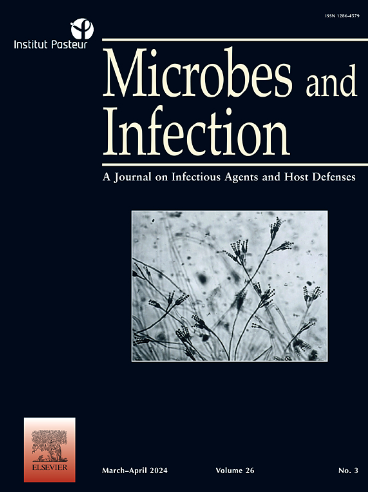抗巨细胞病毒血清阳性与关节炎之间无关联:来自横断面流行病学和遗传关联分析的证据。
IF 2.7
4区 医学
Q3 IMMUNOLOGY
引用次数: 0
摘要
人巨细胞病毒(CMV)是一种与慢性炎症和终身潜伏期相关的β-疱疹病毒,与关节炎的发病机制有关。然而,这种关系的性质仍然存在争议。在这项研究中,我们整合了横断面流行病学分析、遗传相关性评估和孟德尔随机化(MR)方法来阐明巨细胞病毒感染与关节炎相关疾病之间的潜在关联。来自NHANES数据库的5133名参与者的观察性分析显示CMV IgG血清阳性与关节炎呈正相关(OR: 1.24;95% ci: 1.03-1.48;P = 0.02),特别是类风湿关节炎(RA)亚型(OR: 1.94;95% ci: 1.21-3.12;P < 0.01)。然而,在多协变量调整后,这些关联失去了统计学意义(均P < 0.05)。跨不同人口统计学和临床亚群的亚组和相互作用分析进一步证实了这些关联的缺失。同样,亚型分析显示,即使在协变量调整之前,CMV IgG血清阳性与骨关节炎(OA)、其他关节炎或未知关节炎之间也没有显着关联。连锁不平衡评分回归(LDSC)分析显示抗巨细胞病毒IgG水平与关节炎(包括RA和OA)没有显著的遗传相关性(P < 0.05),提示没有共同的遗传基础。此外,双向MR分析未发现巨细胞病毒抗体反应(包括IgG和三种巨细胞病毒相关肽抗原(pp28、pp52和pp150))与关节炎、RA或OA之间存在因果关系的证据(P < 0.05)。总的来说,这些发现表明先前报道的巨细胞病毒血清阳性与关节炎之间的正相关可能被其他协变量混淆,而不是反映真正的因果关系。本文章由计算机程序翻译,如有差异,请以英文原文为准。
No association between anti-cytomegalovirus seropositivity and arthritis: evidence from the cross-sectional epidemiology and genetic association analyses
Human cytomegalovirus (CMV), a β-herpesvirus associated with chronic inflammation and lifelong latency, has been implicated in the pathogenesis of arthritis. However, the nature of this relationship remains controversial. In this study, we integrate cross-sectional epidemiology analyses, genetic correlation assessments, and Mendelian randomization (MR) approaches to elucidate the potential association between CMV infection and arthritis-related conditions. Observational analysis of 5133 participants from the NHANES database revealed a positive association between CMV IgG seropositivity and arthritis (OR: 1.24; 95 % CI: 1.03–1.48; P = 0.02), particularly with the rheumatoid arthritis (RA) subtype (OR: 1.94; 95 % CI: 1.21–3.12; P < 0.01). However, these associations lost statistical significance after adjustment for multiple covariates (all P > 0.05). Subgroup and interaction analyses across different demographic and clinical subpopulations further confirmed the absence of these associations. Similarly, subtype analyses indicated no significant association between CMV IgG seropositivity and osteoarthritis (OA), other-arthritis, or unknown-arthritis, even before covariate adjustment. Linkage disequilibrium score regression (LDSC) analysis did not reveal a significant genetic correlation between anti-CMV IgG levels and arthritis, including RA and OA (all P > 0.05), suggesting no shared genetic basis. Furthermore, bidirectional MR analyses found no evidence of a causal relationship between CMV antibody responses—including IgG and three CMV-related peptide antigens (pp28, pp52, and pp150)—and arthritis, RA, or OA (all P > 0.05). Collectively, these findings suggest that previously reported positive associations between CMV seropositivity and arthritis may have been confounded by other covariates rather than reflecting a true causal relationship.
求助全文
通过发布文献求助,成功后即可免费获取论文全文。
去求助
来源期刊

Microbes and Infection
医学-病毒学
CiteScore
12.60
自引率
1.70%
发文量
90
审稿时长
40 days
期刊介绍:
Microbes and Infection publishes 10 peer-reviewed issues per year in all fields of infection and immunity, covering the different levels of host-microbe interactions, and in particular:
the molecular biology and cell biology of the crosstalk between hosts (human and model organisms) and microbes (viruses, bacteria, parasites and fungi), including molecular virulence and evasion mechanisms.
the immune response to infection, including pathogenesis and host susceptibility.
emerging human infectious diseases.
systems immunology.
molecular epidemiology/genetics of host pathogen interactions.
microbiota and host "interactions".
vaccine development, including novel strategies and adjuvants.
Clinical studies, accounts of clinical trials and biomarker studies in infectious diseases are within the scope of the journal.
Microbes and Infection publishes articles on human pathogens or pathogens of model systems. However, articles on other microbes can be published if they contribute to our understanding of basic mechanisms of host-pathogen interactions. Purely descriptive and preliminary studies are discouraged.
 求助内容:
求助内容: 应助结果提醒方式:
应助结果提醒方式:


